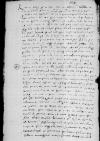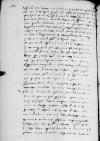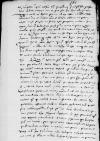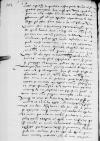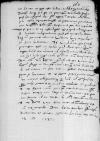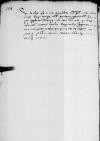Quod ex animo a Dominatione Vestra Reverendissima per cf. [Ioannes DANTISCUS] to [Jan CHOJEŃSKI] Löbau (Lubawa), 1536-05-31, CIDTC IDL 1465⌊litterascf. [Ioannes DANTISCUS] to [Jan CHOJEŃSKI] Löbau (Lubawa), 1536-05-31, CIDTC IDL 1465⌋ meas rogaverim, ut me a curia conservarem immunem, non esse arbitror Dominationi Vestrae Reverendissimae incognitum. In eo id, quod potuit, Dominatio Vestra Reverendissima hactenus praestitit et, ut plane video, impedire iis diebus nequivit, quin iterum ad hanc nostram aulam vocarer, quamque hoc mihi sit molestum futurum, si omnino ire cogar, exprimere non possum. Imprimis quod ad res Poland (Kingdom of Poland, Polonia)⌊RegniPoland (Kingdom of Poland, Polonia)⌋ magnas tractandas sum inutilis et odiosus, si de rebus nostris Prutenicis quicquam per me agi debebit, quas aemuli mei a nemine plus quam a me promoveri ferunt. Quod utique, si possem, deberem Royal Prussia (Prussia Regalis), region, part of Prussia annexed to the Kingdom of Poland in 1466 under the provisions of the Second Peace of Thorn⌊patriaeRoyal Prussia (Prussia Regalis), region, part of Prussia annexed to the Kingdom of Poland in 1466 under the provisions of the Second Peace of Thorn⌋, deberem et patriae patri - Sigismund I Jagiellon (Zygmunt I) (*1467 – †1548), King of Poland and Grand Duke of Lithuania (1506-1548); Duke of Głogów (Glogau) (1499-1506), Duke of Opava (1501-1506), Governor of Silesia (1504-1506); son of King Kazimierz IV Jagiellon and Elisabeth of Austria⌊serenissimae maiestati regiaeSigismund I Jagiellon (Zygmunt I) (*1467 – †1548), King of Poland and Grand Duke of Lithuania (1506-1548); Duke of Głogów (Glogau) (1499-1506), Duke of Opava (1501-1506), Governor of Silesia (1504-1506); son of King Kazimierz IV Jagiellon and Elisabeth of Austria⌋, quae, ubi sub ea res publicae bene diriguntur in suisque iuribus et immunitatibus conservantur, plus inde honoris et emolumenti percipit. Sed in eam, nescio quibus malis fatis, infelicitatem prolapsus sum in aula, ut etiam ea, quae cum multorum bonorum laude optime a me fiunt, in illa pessimam interpretationem accipiant, quo fit, quod non frustra ad eam redire horreo, ut qui vitae genere mutato nihil minus quam aulicus iam esse voverem, totus, quantum per domesticas occupationes et negotia licet, religioni otioque litterario deditus, quod quam suave est quantoque cum dolore relinqui possit, illis, qui eo usi sunt, notum est, quemadmodum et hoc ex superioribus meis litteris Dominatio Vestra Reverendissima accepit.
Redierunt quidam hostes mei mecum in gratiam, maxime autem ille Mikołaj Działyński (Nikolaus von Dzialin) (†1545), from 1507 royal courtier; 1510-1528 Chamberlain of Dobrzyń; 1528-1544 Castellan of Kulm (Chełmno); 1544-1545 Voivode of Pomerania; Starosta of Bratian, Strasburg in Preussen (Brodnica), and Dobrzyń (PSB 6, p. 92-94; Urzędnicy 5/2, p. 204)⌊adulterio no(ta)tusMikołaj Działyński (Nikolaus von Dzialin) (†1545), from 1507 royal courtier; 1510-1528 Chamberlain of Dobrzyń; 1528-1544 Castellan of Kulm (Chełmno); 1544-1545 Voivode of Pomerania; Starosta of Bratian, Strasburg in Preussen (Brodnica), and Dobrzyń (PSB 6, p. 92-94; Urzędnicy 5/2, p. 204)⌋, sed quantum reconciliatis credi possit aut debeat, multorum nos admonent. Quas ab illis pertuli afflictiones, Dominationem Vestram Reverendissimam non praeterit, atqui vicit omnium fortior
cf. Gel. XII 11.7 Quidam veterum poetarum Veritatem Temporis filiam esse dixit. ⌊veritas, non tamen ita vicit, quin adhuc emissi contra me aculei in quarundam de primis memoria et mente haereant, quos temporis filiacf. Gel. XII 11.7 Quidam veterum poetarum Veritatem Temporis filiam esse dixit. ⌋ aliquando evellet. Vocatus sum, inquam, mi Reverendissime Domine, ad curiam postularuntque omnes Royal Council of Poland ⌊consiliiRoyal Council of Poland ⌋ hic nostri ordines magnis precibus atque obtestationibus, ut irem cum magnificis Georg von Baysen (Jerzy Bażyński) (*1469 – †1546), 1503-1512 Chamberlain of Marienburg (Malbork); 1512-1546 Voivode of Marienburg (PSB 1, p. 377)
Jerzy Konopacki Sr (Georg von Konopat) (*ca. 1480 – †1543), brother of Jan Konopacki, Bishop of Kulm (Chełmno); 1512-1516 Chamberlain of Pomerania; 1516-1518 Castellan of Gdańsk (Danzig); 1518-1543 Voivode of Pomerania (PSB 13, p. 547-548)⌊Marienburgensi et Pomeraniae palatinisGeorg von Baysen (Jerzy Bażyński) (*1469 – †1546), 1503-1512 Chamberlain of Marienburg (Malbork); 1512-1546 Voivode of Marienburg (PSB 1, p. 377)
Jerzy Konopacki Sr (Georg von Konopat) (*ca. 1480 – †1543), brother of Jan Konopacki, Bishop of Kulm (Chełmno); 1512-1516 Chamberlain of Pomerania; 1516-1518 Castellan of Gdańsk (Danzig); 1518-1543 Voivode of Pomerania (PSB 13, p. 547-548)⌋ Mikołaj Działyński (Nikolaus von Dzialin) (†1545), from 1507 royal courtier; 1510-1528 Chamberlain of Dobrzyń; 1528-1544 Castellan of Kulm (Chełmno); 1544-1545 Voivode of Pomerania; Starosta of Bratian, Strasburg in Preussen (Brodnica), and Dobrzyń (PSB 6, p. 92-94; Urzędnicy 5/2, p. 204)⌊Culmensi castellanoMikołaj Działyński (Nikolaus von Dzialin) (†1545), from 1507 royal courtier; 1510-1528 Chamberlain of Dobrzyń; 1528-1544 Castellan of Kulm (Chełmno); 1544-1545 Voivode of Pomerania; Starosta of Bratian, Strasburg in Preussen (Brodnica), and Dobrzyń (PSB 6, p. 92-94; Urzędnicy 5/2, p. 204)⌋ nostrarumque terrarum maiorum civitatum nuntiis. Quid,
 BCz, 244, p. 160
inquam, omnium nomine dicturus aut facturus, si ne hiscere quidem licebit? Scit enim Dominatio Vestra Reverendissima, quam acriter sim reprehensus quasi plus curans de paper damaged⌈[e]e paper damaged⌉ privilegiis Prutenicis quam de commodis regis regiis, quasi se privilegia Prutena commodis regiis adversarentur, cum ex illis profectum habeant.
BCz, 244, p. 160
inquam, omnium nomine dicturus aut facturus, si ne hiscere quidem licebit? Scit enim Dominatio Vestra Reverendissima, quam acriter sim reprehensus quasi plus curans de paper damaged⌈[e]e paper damaged⌉ privilegiis Prutenicis quam de commodis regis regiis, quasi se privilegia Prutena commodis regiis adversarentur, cum ex illis profectum habeant.
Fiducia enim privilegiorum regna et respublicae manent integra at(?) sub iustis principibus incrementa accipiunt, quos sic aucta in omnibus facilius et commodius sustinere ac alere illisque tributa et vectigalia pendere atque reliqua paper damaged⌈[a]a paper damaged⌉, quae debere<n>tur, praestare possunt. Indeque est aequa illa libertas, ad quam a natura aspirant omnes. Unde iustitia ortum habet, quae unicuique, quod suum est, tribuit. Et sine qua inter homines nulla firma coniunctio diu esse vel ulla d(omi)natio longo tempore subsistere potest. Si is itaque male tractandus est, qui eiusmodi aequabilitatem non odit, qua sola quaevis respublica tranquillo in statu certoque ordine regi vult, et sine ea diuturna esse nequit, quantum possum me continebo, maxime cum, ut scit Dominatio Vestra Reverendissima, iniunctum mihi est, quod praeter commodum regium aliud procurare non debeam. Quocirca, si cum dominis Council of Royal Prussia the most important local authority in Royal Prussia. It consisted of two bishops (of Ermland (Warmia), who served as the Council’s president, and of Kulm (Chełmno)), three voivodes (of Kulm, Marienburg (Malbork), and Pomerania), three castellans (of Kulm, Elbing (Elbląg), and Gdańsk (Danzig)), three chamberlains (of Kulm, Marienburg, and Pomerania), and representatives of the three Great Prussian Cities – Gdańsk, Thorn (Toruń), and Elbing (ACHREMCZYK 2016, p. 17-18)⌊consiliariis PrutenisCouncil of Royal Prussia the most important local authority in Royal Prussia. It consisted of two bishops (of Ermland (Warmia), who served as the Council’s president, and of Kulm (Chełmno)), three voivodes (of Kulm, Marienburg (Malbork), and Pomerania), three castellans (of Kulm, Elbing (Elbląg), and Gdańsk (Danzig)), three chamberlains (of Kulm, Marienburg, and Pomerania), and representatives of the three Great Prussian Cities – Gdańsk, Thorn (Toruń), and Elbing (ACHREMCZYK 2016, p. 17-18)⌋ ad Diet of Poland ⌊comitiaDiet of Poland ⌋ venirem, mandatum hoc a me transgredi oporteret. Council of Royal Prussia the most important local authority in Royal Prussia. It consisted of two bishops (of Ermland (Warmia), who served as the Council’s president, and of Kulm (Chełmno)), three voivodes (of Kulm, Marienburg (Malbork), and Pomerania), three castellans (of Kulm, Elbing (Elbląg), and Gdańsk (Danzig)), three chamberlains (of Kulm, Marienburg, and Pomerania), and representatives of the three Great Prussian Cities – Gdańsk, Thorn (Toruń), and Elbing (ACHREMCZYK 2016, p. 17-18)⌊IlliCouncil of Royal Prussia the most important local authority in Royal Prussia. It consisted of two bishops (of Ermland (Warmia), who served as the Council’s president, and of Kulm (Chełmno)), three voivodes (of Kulm, Marienburg (Malbork), and Pomerania), three castellans (of Kulm, Elbing (Elbląg), and Gdańsk (Danzig)), three chamberlains (of Kulm, Marienburg, and Pomerania), and representatives of the three Great Prussian Cities – Gdańsk, Thorn (Toruń), and Elbing (ACHREMCZYK 2016, p. 17-18)⌋ enim de commodis Royal Prussia (Prussia Regalis), region, part of Prussia annexed to the Kingdom of Poland in 1466 under the provisions of the Second Peace of Thorn⌊patriaeRoyal Prussia (Prussia Regalis), region, part of Prussia annexed to the Kingdom of Poland in 1466 under the provisions of the Second Peace of Thorn⌋ privilegiisque et libertatibus suis non pauca sunt proposituri, quorum omnium nomine mihi fortassis dicendi campus daretur, ex quo me nulla ratione excipere possem. Quid tamen mihi non impingeretur? Utpote me eius rei ducem, alios a me inductos, me omnia haec struxisse... Nonne hinc gravior contra me quam prius umquam conciperetur indignatio? Et quid non fieret? Qua propter Sigismund I Jagiellon (Zygmunt I) (*1467 – †1548), King of Poland and Grand Duke of Lithuania (1506-1548); Duke of Głogów (Glogau) (1499-1506), Duke of Opava (1501-1506), Governor of Silesia (1504-1506); son of King Kazimierz IV Jagiellon and Elisabeth of Austria⌊serenissimae maiestati regiaeSigismund I Jagiellon (Zygmunt I) (*1467 – †1548), King of Poland and Grand Duke of Lithuania (1506-1548); Duke of Głogów (Glogau) (1499-1506), Duke of Opava (1501-1506), Governor of Silesia (1504-1506); son of King Kazimierz IV Jagiellon and Elisabeth of Austria⌋ oppido quam humillime in litteris meis supplicavi, ut iis de causis atque etiam ob defectum viatici  BCz, 244, p. 161 et sumptuum, cum adhuc persolverem, quae ad praeteriti anni profectionem debita contraxi, me cum gratia sua Löbau (Lubawa, Lubavia), town in northern Poland, Kulm Land (Ziemia Chełmińska), ca. 67 km E of Graudenz (Grudziądz), the main seat of the bishops of Kulm (Chełmno)⌊hic domiLöbau (Lubawa, Lubavia), town in northern Poland, Kulm Land (Ziemia Chełmińska), ca. 67 km E of Graudenz (Grudziądz), the main seat of the bishops of Kulm (Chełmno)⌋ relinqueret utque in eo Dominatio Vestra Reverendissima pro me ad Sigismund I Jagiellon (Zygmunt I) (*1467 – †1548), King of Poland and Grand Duke of Lithuania (1506-1548); Duke of Głogów (Glogau) (1499-1506), Duke of Opava (1501-1506), Governor of Silesia (1504-1506); son of King Kazimierz IV Jagiellon and Elisabeth of Austria⌊eius maiestatemSigismund I Jagiellon (Zygmunt I) (*1467 – †1548), King of Poland and Grand Duke of Lithuania (1506-1548); Duke of Głogów (Glogau) (1499-1506), Duke of Opava (1501-1506), Governor of Silesia (1504-1506); son of King Kazimierz IV Jagiellon and Elisabeth of Austria⌋ intercedat, vehementer oro et obsecro. Quod si forsan obtineri non poterit et sic mihi forsan in fatis est perpetuo motoriam hanc agere fabulam, venturus quidem sum novis implicat(us) debitis modis, quibus possum. Hoc unum dumtaxat liberum mihi sit, ut cum collegis meis libere mihi loqui et transigere omnia liceat habeamque opera Dominationis Vestrae Reverendissimae hoc quod prius vicinum Dominationis Vestrae Reverendissimae apud venerabilem dominum custodem hospitium. Mallem tamen illi molestus non esse meque ea etiam hoc duro instante tempore molestissima carere molestia. Mihi tamen cf. Vulg. Act 9.5; Vulg. Act 26.14 Durum est tibi contra stimulum calcitrare ⌊contra stimulum recalcitrare non est integrumcf. Vulg. Act 9.5; Vulg. Act 26.14 Durum est tibi contra stimulum calcitrare ⌋. Fiat voluntas Domini.
BCz, 244, p. 161 et sumptuum, cum adhuc persolverem, quae ad praeteriti anni profectionem debita contraxi, me cum gratia sua Löbau (Lubawa, Lubavia), town in northern Poland, Kulm Land (Ziemia Chełmińska), ca. 67 km E of Graudenz (Grudziądz), the main seat of the bishops of Kulm (Chełmno)⌊hic domiLöbau (Lubawa, Lubavia), town in northern Poland, Kulm Land (Ziemia Chełmińska), ca. 67 km E of Graudenz (Grudziądz), the main seat of the bishops of Kulm (Chełmno)⌋ relinqueret utque in eo Dominatio Vestra Reverendissima pro me ad Sigismund I Jagiellon (Zygmunt I) (*1467 – †1548), King of Poland and Grand Duke of Lithuania (1506-1548); Duke of Głogów (Glogau) (1499-1506), Duke of Opava (1501-1506), Governor of Silesia (1504-1506); son of King Kazimierz IV Jagiellon and Elisabeth of Austria⌊eius maiestatemSigismund I Jagiellon (Zygmunt I) (*1467 – †1548), King of Poland and Grand Duke of Lithuania (1506-1548); Duke of Głogów (Glogau) (1499-1506), Duke of Opava (1501-1506), Governor of Silesia (1504-1506); son of King Kazimierz IV Jagiellon and Elisabeth of Austria⌋ intercedat, vehementer oro et obsecro. Quod si forsan obtineri non poterit et sic mihi forsan in fatis est perpetuo motoriam hanc agere fabulam, venturus quidem sum novis implicat(us) debitis modis, quibus possum. Hoc unum dumtaxat liberum mihi sit, ut cum collegis meis libere mihi loqui et transigere omnia liceat habeamque opera Dominationis Vestrae Reverendissimae hoc quod prius vicinum Dominationis Vestrae Reverendissimae apud venerabilem dominum custodem hospitium. Mallem tamen illi molestus non esse meque ea etiam hoc duro instante tempore molestissima carere molestia. Mihi tamen cf. Vulg. Act 9.5; Vulg. Act 26.14 Durum est tibi contra stimulum calcitrare ⌊contra stimulum recalcitrare non est integrumcf. Vulg. Act 9.5; Vulg. Act 26.14 Durum est tibi contra stimulum calcitrare ⌋. Fiat voluntas Domini.
Quae in Provincial Diet of Royal Prussia ⌊conventu praeterito ElbingensiProvincial Diet of Royal Prussia ⌋ acta sunt, iam - ut reor - per nuntium Sigismund I Jagiellon (Zygmunt I) (*1467 – †1548), King of Poland and Grand Duke of Lithuania (1506-1548); Duke of Głogów (Glogau) (1499-1506), Duke of Opava (1501-1506), Governor of Silesia (1504-1506); son of King Kazimierz IV Jagiellon and Elisabeth of Austria⌊serenissimae maiestatis regiaeSigismund I Jagiellon (Zygmunt I) (*1467 – †1548), King of Poland and Grand Duke of Lithuania (1506-1548); Duke of Głogów (Glogau) (1499-1506), Duke of Opava (1501-1506), Governor of Silesia (1504-1506); son of King Kazimierz IV Jagiellon and Elisabeth of Austria⌋ ad vos sunt perlata. Nescio, quae nostratium mentes Erinyes (Eumenides, Furies, Dirae) ⌊ErinysErinyes (Eumenides, Furies, Dirae) ⌋ vexat, quod nihil cum illis pro contribution(e) statui potuerint. Venturi sunt Nobility of Royal Prussia ⌊nobilitatisNobility of Royal Prussia ⌋ et istarum factionum nuntii ad Diet of Poland ⌊comitiaDiet of Poland ⌋ futura, a qua praesumptione n(u)llis paper damaged⌈[is]is paper damaged⌉ oblationibus, si qui essent defectus, qui emendari possent, ne Sigismund I Jagiellon (Zygmunt I) (*1467 – †1548), King of Poland and Grand Duke of Lithuania (1506-1548); Duke of Głogów (Glogau) (1499-1506), Duke of Opava (1501-1506), Governor of Silesia (1504-1506); son of King Kazimierz IV Jagiellon and Elisabeth of Austria⌊serenissima maiestas regiaSigismund I Jagiellon (Zygmunt I) (*1467 – †1548), King of Poland and Grand Duke of Lithuania (1506-1548); Duke of Głogów (Glogau) (1499-1506), Duke of Opava (1501-1506), Governor of Silesia (1504-1506); son of King Kazimierz IV Jagiellon and Elisabeth of Austria⌋ nostrorum querelis gravaretur, a Council of Royal Prussia the most important local authority in Royal Prussia. It consisted of two bishops (of Ermland (Warmia), who served as the Council’s president, and of Kulm (Chełmno)), three voivodes (of Kulm, Marienburg (Malbork), and Pomerania), three castellans (of Kulm, Elbing (Elbląg), and Gdańsk (Danzig)), three chamberlains (of Kulm, Marienburg, and Pomerania), and representatives of the three Great Prussian Cities – Gdańsk, Thorn (Toruń), and Elbing (ACHREMCZYK 2016, p. 17-18)⌊dominis consiliariisCouncil of Royal Prussia the most important local authority in Royal Prussia. It consisted of two bishops (of Ermland (Warmia), who served as the Council’s president, and of Kulm (Chełmno)), three voivodes (of Kulm, Marienburg (Malbork), and Pomerania), three castellans (of Kulm, Elbing (Elbląg), and Gdańsk (Danzig)), three chamberlains (of Kulm, Marienburg, and Pomerania), and representatives of the three Great Prussian Cities – Gdańsk, Thorn (Toruń), and Elbing (ACHREMCZYK 2016, p. 17-18)⌋ poterant avocari. Quid ad tot legationes et mandata Sigismund I Jagiellon (Zygmunt I) (*1467 – †1548), King of Poland and Grand Duke of Lithuania (1506-1548); Duke of Głogów (Glogau) (1499-1506), Duke of Opava (1501-1506), Governor of Silesia (1504-1506); son of King Kazimierz IV Jagiellon and Elisabeth of Austria⌊serenissimae maiestatis regiaeSigismund I Jagiellon (Zygmunt I) (*1467 – †1548), King of Poland and Grand Duke of Lithuania (1506-1548); Duke of Głogów (Glogau) (1499-1506), Duke of Opava (1501-1506), Governor of Silesia (1504-1506); son of King Kazimierz IV Jagiellon and Elisabeth of Austria⌋ aliud responsuri sint, nescio, quam quod voluimus facere imperata. Si Sigismund I Jagiellon (Zygmunt I) (*1467 – †1548), King of Poland and Grand Duke of Lithuania (1506-1548); Duke of Głogów (Glogau) (1499-1506), Duke of Opava (1501-1506), Governor of Silesia (1504-1506); son of King Kazimierz IV Jagiellon and Elisabeth of Austria⌊maiestas regiaSigismund I Jagiellon (Zygmunt I) (*1467 – †1548), King of Poland and Grand Duke of Lithuania (1506-1548); Duke of Głogów (Glogau) (1499-1506), Duke of Opava (1501-1506), Governor of Silesia (1504-1506); son of King Kazimierz IV Jagiellon and Elisabeth of Austria⌋ quorundam effrenos animos in concepta pertinacia relinqueret sine animadversione ms. animatversione(!)
⌈animadversioneanimadversione ms. animatversione(!)
⌉, nihil est quod hic Council of Royal Prussia the most important local authority in Royal Prussia. It consisted of two bishops (of Ermland (Warmia), who served as the Council’s president, and of Kulm (Chełmno)), three voivodes (of Kulm, Marienburg (Malbork), and Pomerania), three castellans (of Kulm, Elbing (Elbląg), and Gdańsk (Danzig)), three chamberlains (of Kulm, Marienburg, and Pomerania), and representatives of the three Great Prussian Cities – Gdańsk, Thorn (Toruń), and Elbing (ACHREMCZYK 2016, p. 17-18)⌊dominis consiliariisCouncil of Royal Prussia the most important local authority in Royal Prussia. It consisted of two bishops (of Ermland (Warmia), who served as the Council’s president, and of Kulm (Chełmno)), three voivodes (of Kulm, Marienburg (Malbork), and Pomerania), three castellans (of Kulm, Elbing (Elbląg), and Gdańsk (Danzig)), three chamberlains (of Kulm, Marienburg, and Pomerania), and representatives of the three Great Prussian Cities – Gdańsk, Thorn (Toruń), and Elbing (ACHREMCZYK 2016, p. 17-18)⌋ imputari poterit. Ex illiusmodi dissensionibus, quae paulo ante apud nos exortae invaluerunt, graves superiori tempore hic factae sunt mutationes, principiis certe esset obstandum, capita quidem redacti nobiscum in gratiam quieverunt, virus autem hoc colubrinum adeo reliquis inhaesit membris, ut etiam si illa in multas dissecentur partes, amputatis
 BCz, 244, p. 162
licet capitibus in qualibet adhuc parte vivat et suas operationes exerceat. Hoc, inquam, ipsum virus, quod non sine pure in multis adhuc tumet, acri ut expellatur eget pharmaco, quod nonnisi aequitate et prudentia Sigismund I Jagiellon (Zygmunt I) (*1467 – †1548), King of Poland and Grand Duke of Lithuania (1506-1548); Duke of Głogów (Glogau) (1499-1506), Duke of Opava (1501-1506), Governor of Silesia (1504-1506); son of King Kazimierz IV Jagiellon and Elisabeth of Austria⌊serenissimae maiestatis regiaeSigismund I Jagiellon (Zygmunt I) (*1467 – †1548), King of Poland and Grand Duke of Lithuania (1506-1548); Duke of Głogów (Glogau) (1499-1506), Duke of Opava (1501-1506), Governor of Silesia (1504-1506); son of King Kazimierz IV Jagiellon and Elisabeth of Austria⌋ potest confici.
BCz, 244, p. 162
licet capitibus in qualibet adhuc parte vivat et suas operationes exerceat. Hoc, inquam, ipsum virus, quod non sine pure in multis adhuc tumet, acri ut expellatur eget pharmaco, quod nonnisi aequitate et prudentia Sigismund I Jagiellon (Zygmunt I) (*1467 – †1548), King of Poland and Grand Duke of Lithuania (1506-1548); Duke of Głogów (Glogau) (1499-1506), Duke of Opava (1501-1506), Governor of Silesia (1504-1506); son of King Kazimierz IV Jagiellon and Elisabeth of Austria⌊serenissimae maiestatis regiaeSigismund I Jagiellon (Zygmunt I) (*1467 – †1548), King of Poland and Grand Duke of Lithuania (1506-1548); Duke of Głogów (Glogau) (1499-1506), Duke of Opava (1501-1506), Governor of Silesia (1504-1506); son of King Kazimierz IV Jagiellon and Elisabeth of Austria⌋ potest confici.
Fuit etiam in hoc nostro Provincial Diet of Royal Prussia ⌊Elbingensi conventuProvincial Diet of Royal Prussia ⌋ generosus dominus Stanisław Kostka (*1487 – †1555), as a leader of the so-called nobles' party active in Royal Prussia since 1536, Kostka stood in opposition to most of the members of the Council of Royal Prussia, who wanted to maintain the autonomy of the province and a "balance of power" in terms of governance. The tension between the Prussian Subtreasurer and the Council had been increasing since the Diet in Graudenz (Grudziądz) in 1533. Kostka, connected with the royal court since his youth, was sent to Graudenz as the King's deputy and, contrary to custom, decided to take part in the proceedings. In response to such a step, the Council members stopped the meeting. Kostka accused them of hostility towards the Poles and intervened on this matter at the court. In the absence of the then Bishop of Ermland (Mauritius Ferber) it was Dantiscus who chaired the Graudenz Diet. The incident badly harmed his future relationships with Kostka; 1531-1555 Treasurer of the Prussian lands and Treasurer of Marienburg (Malbork); 1544-1545 Castellan of Elbing (Elbląg), 1545-1546 Castellan of Kulm (Chełmno); 1546-1549 Vice-Voivode of Kulm; 1546-1551 Voivode of Pomerania; 1551-1555 Voivode of Kulm (PSB 14, p. 356; Urzędnicy 5/2, p. 216; MAŁŁEK 1976, p. 119-123)⌊thesaurarius MarienburgensisStanisław Kostka (*1487 – †1555), as a leader of the so-called nobles' party active in Royal Prussia since 1536, Kostka stood in opposition to most of the members of the Council of Royal Prussia, who wanted to maintain the autonomy of the province and a "balance of power" in terms of governance. The tension between the Prussian Subtreasurer and the Council had been increasing since the Diet in Graudenz (Grudziądz) in 1533. Kostka, connected with the royal court since his youth, was sent to Graudenz as the King's deputy and, contrary to custom, decided to take part in the proceedings. In response to such a step, the Council members stopped the meeting. Kostka accused them of hostility towards the Poles and intervened on this matter at the court. In the absence of the then Bishop of Ermland (Mauritius Ferber) it was Dantiscus who chaired the Graudenz Diet. The incident badly harmed his future relationships with Kostka; 1531-1555 Treasurer of the Prussian lands and Treasurer of Marienburg (Malbork); 1544-1545 Castellan of Elbing (Elbląg), 1545-1546 Castellan of Kulm (Chełmno); 1546-1549 Vice-Voivode of Kulm; 1546-1551 Voivode of Pomerania; 1551-1555 Voivode of Kulm (PSB 14, p. 356; Urzędnicy 5/2, p. 216; MAŁŁEK 1976, p. 119-123)⌋, qui tandem id, quod debuit, fecit, neque illi in omnibus, quae ad sopiendam eam contentionem pertinere videbantur ms. videbant(!)
⌈videbanturvidebantur ms. videbant(!)
⌉, mea defuit benevolentia, quod et ipse forsan testabitur; tantum abest, quod mihi obiciebatur, me ab eius abhorrere amicitia. Si Ovid (Publius Ovidius Naso) (*43 BC – †17 or 18 AD), ancient Roman poet⌊NasonisOvid (Publius Ovidius Naso) (*43 BC – †17 or 18 AD), ancient Roman poet⌋ servabit praeceptum, cf. Ov. Ars II 107 ⌊ut ameris amabilis estocf. Ov. Ars II 107 ⌋, nihil patiar illum a me desiderari. Ceterum cum alio supra notato multis verbis inter nos habitis amice fuit expostulatum, unum hoc fatebatur se scripsisse ad curiam, quod ea de re sibi male voluissem, quod superinscribed⌈quodquod superinscribed⌉ ex natione Polona nativam duceret originem. Ad quod Stanisław Kostka (*1487 – †1555), as a leader of the so-called nobles' party active in Royal Prussia since 1536, Kostka stood in opposition to most of the members of the Council of Royal Prussia, who wanted to maintain the autonomy of the province and a "balance of power" in terms of governance. The tension between the Prussian Subtreasurer and the Council had been increasing since the Diet in Graudenz (Grudziądz) in 1533. Kostka, connected with the royal court since his youth, was sent to Graudenz as the King's deputy and, contrary to custom, decided to take part in the proceedings. In response to such a step, the Council members stopped the meeting. Kostka accused them of hostility towards the Poles and intervened on this matter at the court. In the absence of the then Bishop of Ermland (Mauritius Ferber) it was Dantiscus who chaired the Graudenz Diet. The incident badly harmed his future relationships with Kostka; 1531-1555 Treasurer of the Prussian lands and Treasurer of Marienburg (Malbork); 1544-1545 Castellan of Elbing (Elbląg), 1545-1546 Castellan of Kulm (Chełmno); 1546-1549 Vice-Voivode of Kulm; 1546-1551 Voivode of Pomerania; 1551-1555 Voivode of Kulm (PSB 14, p. 356; Urzędnicy 5/2, p. 216; MAŁŁEK 1976, p. 119-123)⌊illiStanisław Kostka (*1487 – †1555), as a leader of the so-called nobles' party active in Royal Prussia since 1536, Kostka stood in opposition to most of the members of the Council of Royal Prussia, who wanted to maintain the autonomy of the province and a "balance of power" in terms of governance. The tension between the Prussian Subtreasurer and the Council had been increasing since the Diet in Graudenz (Grudziądz) in 1533. Kostka, connected with the royal court since his youth, was sent to Graudenz as the King's deputy and, contrary to custom, decided to take part in the proceedings. In response to such a step, the Council members stopped the meeting. Kostka accused them of hostility towards the Poles and intervened on this matter at the court. In the absence of the then Bishop of Ermland (Mauritius Ferber) it was Dantiscus who chaired the Graudenz Diet. The incident badly harmed his future relationships with Kostka; 1531-1555 Treasurer of the Prussian lands and Treasurer of Marienburg (Malbork); 1544-1545 Castellan of Elbing (Elbląg), 1545-1546 Castellan of Kulm (Chełmno); 1546-1549 Vice-Voivode of Kulm; 1546-1551 Voivode of Pomerania; 1551-1555 Voivode of Kulm (PSB 14, p. 356; Urzędnicy 5/2, p. 216; MAŁŁEK 1976, p. 119-123)⌋ respondi hinc se mihi fuisse longe cariorem, cum et Sigismund I Jagiellon (Zygmunt I) (*1467 – †1548), King of Poland and Grand Duke of Lithuania (1506-1548); Duke of Głogów (Glogau) (1499-1506), Duke of Opava (1501-1506), Governor of Silesia (1504-1506); son of King Kazimierz IV Jagiellon and Elisabeth of Austria⌊maiestas regiaSigismund I Jagiellon (Zygmunt I) (*1467 – †1548), King of Poland and Grand Duke of Lithuania (1506-1548); Duke of Głogów (Glogau) (1499-1506), Duke of Opava (1501-1506), Governor of Silesia (1504-1506); son of King Kazimierz IV Jagiellon and Elisabeth of Austria⌋ multique domini et boni amici mei in Poland (Kingdom of Poland, Polonia)⌊PoloniaPoland (Kingdom of Poland, Polonia)⌋, quos impensissime observarem et amarem, eius essent nationis, falsamque ms. falsumque(!)
⌈falsamquefalsamque ms. falsumque(!)
⌉ ea in re fuisse opinion(em) sua<m>, ut igitur eam exueret sanioremque de me conciperet, me siquidem non hominem, sed vitia eius omnibus passim manifesta odio habuisse. Iamque et aetas et dignitatis ratio et quod de iis maius et terribilius esset, divinam ultionem postular(e), ut tandem desisteret. Ibi tum Stanisław Kostka (*1487 – †1555), as a leader of the so-called nobles' party active in Royal Prussia since 1536, Kostka stood in opposition to most of the members of the Council of Royal Prussia, who wanted to maintain the autonomy of the province and a "balance of power" in terms of governance. The tension between the Prussian Subtreasurer and the Council had been increasing since the Diet in Graudenz (Grudziądz) in 1533. Kostka, connected with the royal court since his youth, was sent to Graudenz as the King's deputy and, contrary to custom, decided to take part in the proceedings. In response to such a step, the Council members stopped the meeting. Kostka accused them of hostility towards the Poles and intervened on this matter at the court. In the absence of the then Bishop of Ermland (Mauritius Ferber) it was Dantiscus who chaired the Graudenz Diet. The incident badly harmed his future relationships with Kostka; 1531-1555 Treasurer of the Prussian lands and Treasurer of Marienburg (Malbork); 1544-1545 Castellan of Elbing (Elbląg), 1545-1546 Castellan of Kulm (Chełmno); 1546-1549 Vice-Voivode of Kulm; 1546-1551 Voivode of Pomerania; 1551-1555 Voivode of Kulm (PSB 14, p. 356; Urzędnicy 5/2, p. 216; MAŁŁEK 1976, p. 119-123)⌊illeStanisław Kostka (*1487 – †1555), as a leader of the so-called nobles' party active in Royal Prussia since 1536, Kostka stood in opposition to most of the members of the Council of Royal Prussia, who wanted to maintain the autonomy of the province and a "balance of power" in terms of governance. The tension between the Prussian Subtreasurer and the Council had been increasing since the Diet in Graudenz (Grudziądz) in 1533. Kostka, connected with the royal court since his youth, was sent to Graudenz as the King's deputy and, contrary to custom, decided to take part in the proceedings. In response to such a step, the Council members stopped the meeting. Kostka accused them of hostility towards the Poles and intervened on this matter at the court. In the absence of the then Bishop of Ermland (Mauritius Ferber) it was Dantiscus who chaired the Graudenz Diet. The incident badly harmed his future relationships with Kostka; 1531-1555 Treasurer of the Prussian lands and Treasurer of Marienburg (Malbork); 1544-1545 Castellan of Elbing (Elbląg), 1545-1546 Castellan of Kulm (Chełmno); 1546-1549 Vice-Voivode of Kulm; 1546-1551 Voivode of Pomerania; 1551-1555 Voivode of Kulm (PSB 14, p. 356; Urzędnicy 5/2, p. 216; MAŁŁEK 1976, p. 119-123)⌋ de plurimis se excusare meque facilem ad credendum esse dicere et nescio quae alia in medium producere, in Poland (Kingdom of Poland, Polonia)⌊PoloniaPoland (Kingdom of Poland, Polonia)⌋ scilicet eiusmodi excessus ab episcopis non castigari, quod et ipsi interdum eo morbo laborarent, nominatimque quosdam expressit pertingens usque Poznań (Posen, Posnania), city in west-central Poland, Wielkopolska, on the Warta river⌊PosnaniamPoznań (Posen, Posnania), city in west-central Poland, Wielkopolska, on the Warta river⌋. Dolere quidem me aiebam, si ita esset de episcopis, quos in bono imitari conveniret, illi de suis gregibus,  BCz, 244, p. 163 me de meo, cuius ipse esset haedus, redditurus rationem, discessum denique sub spe et promissione emendationis. Postero post hoc colloquium die cum essemus in consilio, adiunctis sibi dominis Georg von Baysen (Jerzy Bażyński) (*1469 – †1546), 1503-1512 Chamberlain of Marienburg (Malbork); 1512-1546 Voivode of Marienburg (PSB 1, p. 377)
BCz, 244, p. 163 me de meo, cuius ipse esset haedus, redditurus rationem, discessum denique sub spe et promissione emendationis. Postero post hoc colloquium die cum essemus in consilio, adiunctis sibi dominis Georg von Baysen (Jerzy Bażyński) (*1469 – †1546), 1503-1512 Chamberlain of Marienburg (Malbork); 1512-1546 Voivode of Marienburg (PSB 1, p. 377)
Jerzy Konopacki Sr (Georg von Konopat) (*ca. 1480 – †1543), brother of Jan Konopacki, Bishop of Kulm (Chełmno); 1512-1516 Chamberlain of Pomerania; 1516-1518 Castellan of Gdańsk (Danzig); 1518-1543 Voivode of Pomerania (PSB 13, p. 547-548)⌊Marienburgensi et Pomeraniae palatinisGeorg von Baysen (Jerzy Bażyński) (*1469 – †1546), 1503-1512 Chamberlain of Marienburg (Malbork); 1512-1546 Voivode of Marienburg (PSB 1, p. 377)
Jerzy Konopacki Sr (Georg von Konopat) (*ca. 1480 – †1543), brother of Jan Konopacki, Bishop of Kulm (Chełmno); 1512-1516 Chamberlain of Pomerania; 1516-1518 Castellan of Gdańsk (Danzig); 1518-1543 Voivode of Pomerania (PSB 13, p. 547-548)⌋ cum Ludwig von Mortangen (Ludwik Mortęski) (†1539), 1512-1516 Castellan of Gdańsk (Danzig); 1516-1539 Castellan of Elbing (Elbląg) (SBPN 3, p. 256-257; PSB 22 Morsztyn Zbigniew - Mytkowicz, p. 9-11)⌊castellano ElbingensiLudwig von Mortangen (Ludwik Mortęski) (†1539), 1512-1516 Castellan of Gdańsk (Danzig); 1516-1539 Castellan of Elbing (Elbląg) (SBPN 3, p. 256-257; PSB 22 Morsztyn Zbigniew - Mytkowicz, p. 9-11)⌋ seorsum me per illos rogavit, ut si qua in re me offendisset et si quid adversus se haberem indignationis, quod sibi amice remitterem. Idque non gravate obtinuit. Utinam huius tragoediae sic finis habeatur.
De coadiutoria, sicut mihi promissum est, non habeo, quod dubitem. Quam primum respondebit ex Livonia (Livland, Inflanty), estate of Livonian Order, today part of Latvia and Estonia⌊LivoniaLivonia (Livland, Inflanty), estate of Livonian Order, today part of Latvia and Estonia⌋ ad electionem citatus dominus Leonard Niederhoff (*ca. 1485 – †1545), doctor of both canon and civil law, friend of Nicolaus Copernicus and executor of his will; studied in Cracow, Leipzig and Rome, where he obtained a doctoral degree; from 1511 parish priest of St. Bartholomew's Church in Gdańsk (Danzig); from 1515 Canon of Ermland (Warmia), and from 1519 Canon of Dorpat; from 1532 Dean of the Ermland Chapter; he also had a canonry in Kulm from which he resigned in 1533. In 1530, after Dantiscus' resignation, became a parish priest of the Blessed Virgin Mary Church in Gdańsk (KOPICZKO 2, p. 231; SBKW, p. 175)⌊Leonardus NyderhoffLeonard Niederhoff (*ca. 1485 – †1545), doctor of both canon and civil law, friend of Nicolaus Copernicus and executor of his will; studied in Cracow, Leipzig and Rome, where he obtained a doctoral degree; from 1511 parish priest of St. Bartholomew's Church in Gdańsk (Danzig); from 1515 Canon of Ermland (Warmia), and from 1519 Canon of Dorpat; from 1532 Dean of the Ermland Chapter; he also had a canonry in Kulm from which he resigned in 1533. In 1530, after Dantiscus' resignation, became a parish priest of the Blessed Virgin Mary Church in Gdańsk (KOPICZKO 2, p. 231; SBKW, p. 175)⌋, etiam eo invito omnia transigentur, Dominationi autem Vestrae Reverendissimae, quemadmodum per cubicularium regium scripsi in novissimis, iterum iterumque gratias habeo. Sed de iis coram, si secus fieri non poterit, tutius et latius. Porro, si hoc coram Dominatione Vestra Reverendissima posset commutari, ut hic maneat colloquereturque per litteras, nihil est quod hoc tempore mihi gratius et commodius accideret, ad quod, ut Dominatio Vestra Reverendissima omnes, quos potest, intendat or intrudat(?)⌈intendatintendat or intrudat(?)⌉ nervos, quantum possum enixius oro. Meque cum hoc nuntio meo, quem peto cum primis ad me remitti, de omnibus certiorem reddat Dominatio Vestra Reverendissima, cuius fraterno amori et benevolentiae ex animo me commendo. Dominus Deus eandem quam diutissime incolumem et felicem conservet.
 BCz, 244, p. 160
inquam, omnium nomine dicturus aut facturus, si ne hiscere quidem licebit? Scit enim Dominatio Vestra Reverendissima, quam acriter sim reprehensus quasi plus curans de paper damaged⌈[e]e paper damaged⌉ privilegiis Prutenicis quam de commodis regis regiis, quasi se privilegia Prutena commodis regiis adversarentur, cum ex illis profectum habeant.
BCz, 244, p. 160
inquam, omnium nomine dicturus aut facturus, si ne hiscere quidem licebit? Scit enim Dominatio Vestra Reverendissima, quam acriter sim reprehensus quasi plus curans de paper damaged⌈[e]e paper damaged⌉ privilegiis Prutenicis quam de commodis regis regiis, quasi se privilegia Prutena commodis regiis adversarentur, cum ex illis profectum habeant.
 BCz, 244, p. 161 et sumptuum, cum adhuc persolverem, quae ad praeteriti anni profectionem debita contraxi, me cum gratia sua
BCz, 244, p. 161 et sumptuum, cum adhuc persolverem, quae ad praeteriti anni profectionem debita contraxi, me cum gratia sua  BCz, 244, p. 162
licet capitibus in qualibet adhuc parte vivat et suas operationes exerceat. Hoc, inquam, ipsum virus, quod non sine pure in multis adhuc tumet, acri ut expellatur eget pharmaco, quod nonnisi aequitate et prudentia
BCz, 244, p. 162
licet capitibus in qualibet adhuc parte vivat et suas operationes exerceat. Hoc, inquam, ipsum virus, quod non sine pure in multis adhuc tumet, acri ut expellatur eget pharmaco, quod nonnisi aequitate et prudentia  BCz, 244, p. 163 me de meo, cuius ipse esset haedus, redditurus rationem, discessum denique sub spe et promissione emendationis. Postero post hoc colloquium die cum essemus in consilio, adiunctis sibi dominis
BCz, 244, p. 163 me de meo, cuius ipse esset haedus, redditurus rationem, discessum denique sub spe et promissione emendationis. Postero post hoc colloquium die cum essemus in consilio, adiunctis sibi dominis 